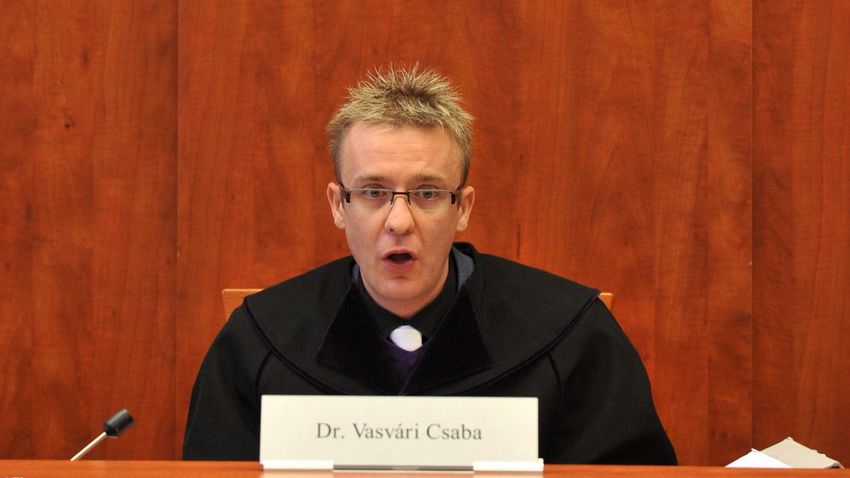In the past period, the role of the weak parliamentary opposition has been regularly taken over in Hungary by public law institutions and officials who are otherwise not called upon to do so. Regarding whether certain actors of the justice system may be involved in this regard, they are increasingly the subject of public discourse and social debates, writes Magyar Nemzet the Tűzfalcsoport Blogstar site .
In a recent announcement, the National Council of Judges most emphatically rejects all claims published in the Hungarian press that any Hungarian judge in office has ever been a "terrorist" judge of any kind or could be linked to any political figure.
The background of the case is that Csaba Vasvári, the group leader judge of the Pest Central District Court, the press spokesperson of the National Judicial Council, made a statement to the liberal British newspaper The Guardian, in whose columns he expressed his opinion that the "government interferes in the work of the courts", although in recent years speaking in the liberal media, Vasvári did not have to answer any unpleasant questions regarding his decisions in 2006, these matters were rather deliberately kept quiet.
From all this, it may seem that Vasvári is only concerned about the rule of law when Hungary has a right-wing government. The phenomenon may be familiar to many from the past decade, highlights the Mediaworks-Hírcentrum report.
However, the judicial outburst is not necessarily considered unusual. Previously, it caused a serious clash in professional circles that the OBT launched a political attack against Tünde Handó, the former president of the National Court Office, and Péter Darák, who was also involved in codification work under the Medgyessy government - ex-chairman of the Curia who sympathizes with the OBT - decided to instead provides the rebel judiciary. By the way, according to our sources, the fact that they could trust in the support mentioned by Darák may have played a role in the fact that the OBT took increasingly perverse steps over time, writes the Tűzfal group in its article.
The article recalls that the name of the judge at the center of the current OBT press statement cannot necessarily be unknown to the law-abiding public.
Csaba Vasvári, who appeared on ATV's Friderikusz most program on October 12, 2006 and said even then that he "must be able to bear" the epithet blood judge, seems to have become more sensitive since then and has a harder time bearing criticism.
At least this is evident from the fact that, according to 444.hu, the spokesperson of the National Judicial Council (!) complained to the British Observer that he and his colleagues have been the alleged victims of "external and internal influence attempts" (!) for years.
According to the court sources of the Firewall Group, the ominous statement does not contain substantive specifics, but it is excellent for creating a mood.
Vasvári, who used to judge at the Central District Court in Pest, is not known for his calm temper; according to some reports, he sued the former president of the OBH in connection with an unsuccessful application for the Metropolitan Court Board, and later sued the Metropolitan Court for HUF 135 (!) because, according to his opinion, it was transferred to him late his remuneration.
However, what is even more exciting is that Vasvári does not always know the boundaries even during his professional judgment work. in connection with its decision , the Court stated that the court will adjust the prison sentence imposed in the member state judgment in accordance with the upper limit of the sentence that can be determined based on Hungarian law, if the term of the prison sentence imposed in the member state judgment is longer than what could be determined based on Hungarian law .
Judge Vasvári suddenly decided to enforce the Anglo-Saxon legal approach in one of his decisions, exceeding the upper limit established in the relevant section of the Hungarian criminal law when imposing the sentence.
Against Vasvári's order, the chief prosecutor presented a motion for legal redress in the interest of legality, in order to establish that the court's order violates the law, and based on this, the imprisonment imposed by the member state court on the defendant is a lighter punishment. The highest judicial forum found that Vasvári's decision regarding the collective punishment imposed on the accused was seriously illegal.
According to the Firewall Group, it should be noted that the National Judicial Council, which joined the anti-Warsaw axis of the European Union at a critical moment with its decision last week, was also ready to assist in undermining the authority of the Polish government.
The board discussed the initiative of the European Network of Judicial Councils (ENCJ) behind closed doors in one of the halls of the Kuria and, according to our information at the time, supported the proposal to suspend the ENCJ membership of the Polish Judicial Council (KRS) with a majority decision of 6:4.
The Basic Law and CLXI of 2011 on the organization and administration of courts. law established the OBT with the aim of supervising the National Court Office, which performs the central administration of the courts. However, this professional control cannot in any way mean political positioning, the basic function of the OBT is to control the work of the OBH.
The original, full article is available HERE
Cover photo: Csaba Vasvári (Photo: MTI/Tamás Kovács)
Recommendation on the topic:
Csaba Vasvári was washed clean on Wikipedia
The former chief judge also ruled in the case of liberal "civilians".













